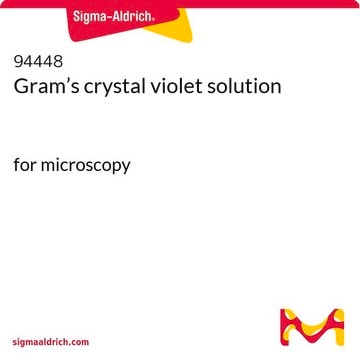01869
Hippurate Strips Kit
suitable for microbiology
Synonym(s):
Hippurate Strips
About This Item
Recommended Products
technique(s)
microbe id | specific enzyme detection: suitable
application(s)
clinical testing
environmental
food and beverages
microbiology
storage temp.
2-8°C
suitability
Campylobacter spp.
Gardnerella vaginalis
Streptococcus spp.
Looking for similar products? Visit Product Comparison Guide
Related Categories
Application
The test is based on hydrolysis of substrate (sodium hippurate) by the bacterial enzyme hippurate hydrolase and production of benzoic acid and glycine. Glycine produced by this enzymatic reaction is detected after 24 hours incubation in reaction with chromogen (ninhydrine) and the blue-purple substance is produced.
Components
Signal Word
Danger
Hazard Statements
Precautionary Statements
Hazard Classifications
Acute Tox. 4 Oral - Eye Dam. 1 - Flam. Liq. 2 - Skin Irrit. 2 - STOT SE 3
Target Organs
Central nervous system, Respiratory system
Storage Class Code
3 - Flammable liquids
Flash Point(F)
50.0 °F - closed cup
Flash Point(C)
10 °C - closed cup
Personal Protective Equipment
Choose from one of the most recent versions:
Already Own This Product?
Find documentation for the products that you have recently purchased in the Document Library.
Customers Also Viewed
Articles
For microbiologists the most fundamental stain was developed in 1884 by the Danish bacteriologist Hans Christian Gram.
Protocols
Listeria is a public health concern, affecting elderly, pregnant, newborns, and immunocompromised individuals.
Our team of scientists has experience in all areas of research including Life Science, Material Science, Chemical Synthesis, Chromatography, Analytical and many others.
Contact Technical Service







